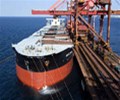

After posting record exports in May and June 2021, Australia recently announced a new record in July. Exports of iron ore, coal and liquefied natural gas exports all rose strongly, giving Australia a record trade surplus, plus a boost to mining profits and tax revenue.
“Non-rural goods rose $2,275m (7%), driven by other mineral fuels, metal ores and minerals and coal, coke and briquettes,” the Australian Bureau of Statistics reported.
“The increases in other mineral fuels and coal, coke and briquettes were driven by LNG and thermal coal, respectively. Increased exports to Northern Asian countries coincided with an unseasonably warm northern summer.
“The increase in metal ores and minerals was driven by iron ore on the back of strong demand from China.”
In July, total exports, including services, reached a record of A$45.95 billion.
The Australian Bureau of Statistics reported the trade surplus climbed to A$12.1 billion (US $8.91 billion) in July. The surplus reached an already high A$11.1 billion in June.
Overall, exports were up 5% because of strong demand from Asian countries for LNG and thermal coal, combined with higher prices for iron ore, Reuters reported.
Imports rose 3% to $33.8 billion, largely due to a sharp increase in parts and accessories for telecommunications equipment.
In the same period, exports to China also hit a record of A$19.4 billion. The total marked a 72% year-over-year jump. China accounted for 42% of Australia’s total exports in July. Furthermore, China accounts for a majority of Australia’s iron ore exports.
Steel flow
But the flow from China to Australia, especially where steel is concerned, has not been something to write home about.
In recent months, China’s steel shipments to Australia have fallen by more than half, faster than the country’s overall net exports plunge, the Global Times reported.
This could have an adverse effect on Australia’s economy, as the country is poised to embark on a major infrastructure uplift.
China is Australia’s largest export market, buying approximately 80% of its iron ore exports. Additionally, China is a significant buyer of Australian LNG exports. However, trade tensions between the two countries have virtually stopped trade in coking and thermal coal.
On the increasing amount of coal exports, Australia has reaffirmed that despite a call by the United Nations (UN) to phase out fossil fuel, coal will remain a major contributor to Australia’s economy well beyond 2030, Reuters reported. Reuters reported that Australia’s resources minister Keith Pitt had said after the UN call that Australia’s latest export figures showed that the reports of coal’s impending death were “greatly exaggerated.”
In the three months to July, coal exports grew 26% to A$12.5 billion (US $9.3 billion). As global economies recover from COVID-19 restrictions, coal prices have also risen.
Source: MetalMiner